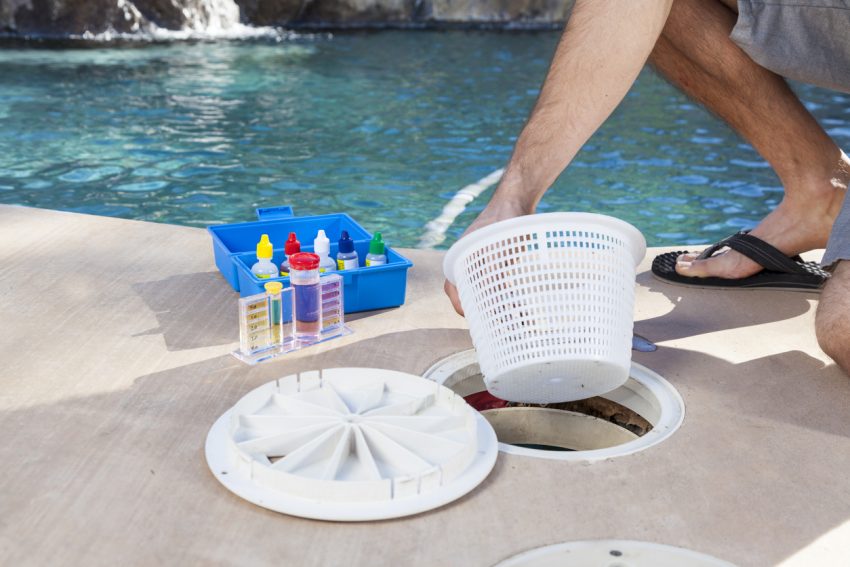Ignoring frequent blunders is essential to maintaining a flawless pool. Avoiding these errors will determine how long your aquatic refuge lasts and how beautiful it looks. Let’s explore five typical errors you should be careful to avoid as you will unpack the complexities of pool upkeep.
1. Neglecting Regular Water Testing: The Foundation of Pool Health
The key to efficient pool care is regular water testing, although this is often neglected. If you skip this important step, your pool’s chemistry can go out of balance, causing murky water, algae growth, and discomfort for swimmers. A common mistake made by many pool owners is to believe that if the water is clean, it must be healthy. On the other hand, invisible problems like acidity, alkalinity, or low chlorine might go unreported for a long time. Purchase a trustworthy water testing kit and follow a regular testing plan. At the very least once a week, particularly during times of high use, test the water in your pool. By keeping the chemical balance at its ideal level, you can protect your pool’s equipment from early wear and tear and provide a welcoming and safe swimming experience.
2. Overlooking Skimming and Brushing: The Art of Pool Surface Maintenance
Although brushing and skimming can appear simple, many people underestimate how important they are to pool care. Using a net or skimmer basket, skim the pool’s surface every day to get rid of floating impurities, bugs, and debris before they settle. If you skip this step, organic debris will break down and produce murky water, which will put more strain on your filtering system. Regular brushing of pool surfaces is equally important in preventing the formation of algae and permanent stains. Invest in a top-notch pool brush made of the appropriate material for your pool—vinyl, fiberglass, or concrete.
3. Ignoring Pump and Filter Maintenance: The Heart of Pool Circulation
The unsung heroes who toil endlessly to keep your pool’s water clear and clean are the pump and filter. In pool care, neglecting their upkeep is a grave sin. To avoid blockages, you should routinely empty the strainer basket on your pump and replace or clean the filters in accordance with the manufacturer’s instructions. Check your pump for wear indicators, leaks, and strange sounds. Addressing pool leak detection is another crucial aspect of maintenance. Regularly inspect the pool area for any signs of leaks, such as water puddles around the equipment or drops in water levels beyond normal evaporation. Efficient pool leak detection can prevent potential damage and water loss. Furthermore, make sure the pump is the right size for your pool to prevent overuse and possible burnout.
4. Overdoing the Chemicals: The Perils of Imbalanced Pool Chemistry
Even while keeping the right water chemistry is essential, overdoing the chemicals is a common error that can seriously harm your pool. Overuse of chlorine or other sanitizers can harm pool surfaces, irritate skin and eyes, and even put swimmers’ health in danger. When it comes to pool chemicals, more isn’t necessarily better. Always abide by the suggested dose directions and manufacturer’s guidelines. Resist the urge to “shock” your pool too much, as this might disturb the delicate chemical balance and lower the quality of the water. Test your water often, and make small, moderation-based chemical adjustments. Aim for a harmonic balance that protects swimmer health and comfort while avoiding needless risks or difficulties.
5. Delaying Repairs: The Costly Consequence of Procrastination
When it comes to pool upkeep, procrastination is a typical mistake that can result in more serious concerns and higher repair expenses. Delaying maintenance causes small problems, like a broken tile, a leaky pool pump, or a faulty filter, to become worse. Check your pool often for indications of wear, damage, or malfunction. Taking care of repairs as soon as possible can protect your pool’s general integrity and stop more deterioration. Specifically, leaks can result in water loss, higher utility costs, and even structural damage if they are ignored.
Conclusion
Avoiding these typical blunders in the complex dance of pool upkeep is essential to the well-being and lifespan of your aquatic haven. You can improve your pool-keeping abilities and continue to enjoy a dazzling, welcoming pool for years to come by adopting a proactive and attentive attitude. Remember these tips, and let your pool serve as an example of your proficiency in pool upkeep.

